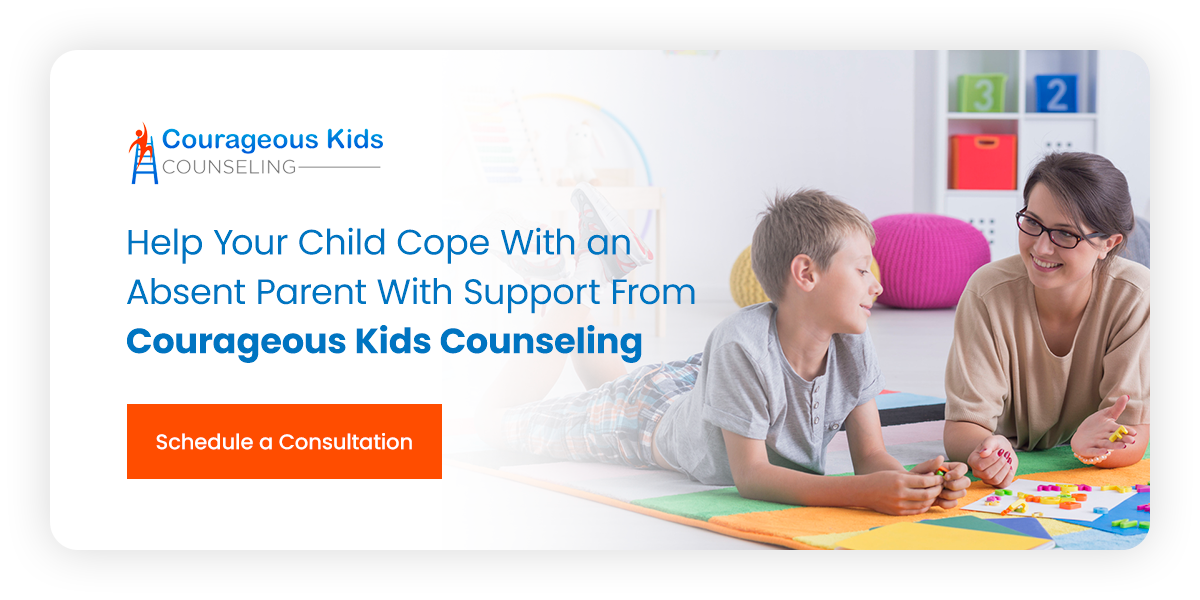Table of Contents
How to Support a Child with an Absent Parent
An absent parent can significantly impact a child, but compassionate support helps children find joy and overcome challenges. Understanding how to comfort a child who misses an absent parent is essential for their mental and emotional well-being.
What Are the Psychological Effects of Absent Parents?
Parents play a significant role in their child’s self-esteem, sense of security and trust. Extra support can help children navigate the following effects they may experience if a parent is missing from their lives:
- Emotional distress
- Feelings of sadness, anger and confusion
- Anxiety and depression
- Difficulty trusting others
- Trauma
- Social anxiety and low self-esteem
- Avoidant or anxious attachment styles
- Challenges forming healthy relationships later in life
- Behavioral challenges
- Lower performance in school
How to Support a Child With an Absent Parent
You can help reduce an absent parent’s effect on a child with helpful tips and coping strategies such as the following:
Help Manage Expectations
In some cases, you may need to learn how to help a child with an inconsistent father or mother. Occasional, inconsistent visits can cause confusion and disappointment, so it’s important to help children manage their expectations.
While optimistic thinking is essential for problem-solving, learning and overcoming challenges, you should also be honest about the absent parent. If a child is looking forward to a visit that may or may not occur, help them prepare for either outcome. Ask them to think of something fun they might like to do instead if the parent skips the visit, or give them something else to look forward to. You might visit another family member, arrange a play date with friends or enjoy some time at the park.
Build Trust and Open Communication
Give your child a safe environment to express their feelings and ask questions. Taking a few minutes each day to ask how they feel can encourage emotional openness and build trust so they feel safe coming to you for support.
Validate Emotions

Validating your child’s emotions helps them feel valued, understood and safe. Simple statements, such as “I hear you,” “I understand” and “Let’s get through this together,” remind them that they’re not alone and that challenging emotions are normal.
Encourage Positive Relationships With Reliable Caregivers
Developing secure attachments with caregivers helps children feel safe, explore the world with confidence and form healthy relationships later in life. An absent parent can hinder a child’s social development, but you can help them form secure attachments with yourself and other caregivers in the following ways:
- Spend quality time with them.
- Learn about and engage with them in their interests and hobbies.
- Be available to meet their needs and provide undivided attention.
- Foster connection with a warm voice, eye contact and hugs.
- Maintain healthy guidelines and structure.
Introduce Positive Influences in Your Child’s Life
While family members are excellent influences in a child’s life, you can help your child develop healthy connections with role models outside of the family. Consider the following ways you can introduce positive influences in your child’s life:
- Mentorship from a program such as Big Brothers Big Sisters of America
- Time with trusted neighbors and family friends
- Involvement in a community program
- Mentorship through extracurricular activities such as dance, art classes or sports
- Time with teachers or academic tutors
- Youth centers or library programs
Teach Helpful Coping Strategies
Help your child work through challenging emotions with creative coping strategies such as:
- Journaling
- Deep breathing
- Creative expression through artistic activities
- Movement activities such as stretching, jumping jacks or running
- Playing an instrument or listening to music
- Playing or exploring outdoors
- Talking to a friend or trusted caregiver
- Guided imagery
- Hugging a stuffed animal
- Expressing anger safely by ripping paper or squeezing a stress ball
Learn More About Your Child’s Needs
If your child expresses that they miss their absent parent, consider how you can meet some of your child’s unspoken needs. Ask them what they picture when they think about their absent parent being around or what they think that parent would do each day.
You can use your child’s answers to discover what they might desire. For example, your child might express that they believe the absent parent would play outside with them or cook special food. These beliefs indicate that your child may desire these things, so you can help meet their needs by taking them to the park or cooking a fun meal together.
Use Books to Show That All Families Are Special
Books are excellent tools for children to explore challenging topics in a fun, safe way. Find children’s books featuring one-parent families, and plan special reading times with your child.
Focus on Facts Over Personal Opinions
Remain neutral when you discuss your child’s absent parent. Let your child know that their other parent loves them but may not know how to show it. Remind them that they can’t control what their other parent does and that it’s not their fault if the parent is absent or inconsistent.
It’s also helpful to avoid saying anything negative about the other parent or sharing your personal opinions about them. Focusing on facts prevents confusion and can help children process emotions in healthy ways.
Serve as a Positive Role Model
Positive thinking, coping strategies, communication and secure attachments are easier to teach your child when you demonstrate them. You can be your child’s greatest role model by regulating your emotions and practicing healthy coping skills in times of disappointment. These practices can also help build your child’s trust and sense of security.
Seek Professional Support From Compassionate Therapists
Therapy can help a child grow and feel happier. Children are quicker to adapt and learn than adults, so childhood is the perfect time for them to get support and start building healthy coping strategies. Your child can benefit from therapy through:
- Individualized support: Experienced therapists work closely with children, getting to know them and their needs so they can offer individualized support.
- Coping strategies: Therapists can teach your child effective coping strategies to regulate their emotions.
- Mind-body connection: A therapist can teach your child about the mind-body connection, helping them understand how their emotions, thoughts and behaviors affect their physical health.
- Improved relationships and healthy attachments: A therapist works with children and families, offering helpful strategies to help parents support their children and build healthy relationships. Seeking help from a therapist can help you strengthen the bond between you and your child.
Help Your Child Cope With an Absent Parent With Support From Courageous Kids Counseling
Healthy coping strategies, positive influences, open communication and professional counseling can help your child grow and thrive. While an absent parent affects a child’s mental and emotional health, proper support can make a significant difference and positively impact their well-being.
Courageous Kids Counseling offers compassionate, individualized therapy services for children, families and teens. Our experienced therapists work closely with your child to understand their needs and develop step-by-step goals. We work with families and children as partners, using a positive team approach to help kids through challenging times. Schedule a consultation or contact us to learn more about how we can help your child cope with an absent parent.



